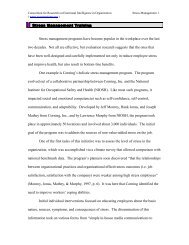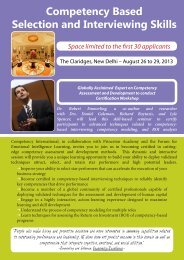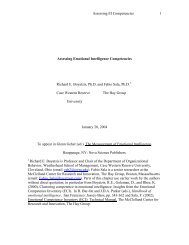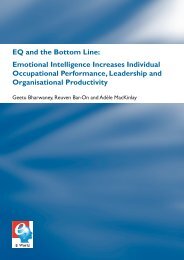Unleashing the Power of Self-Directed Learning (.pdf)
Unleashing the Power of Self-Directed Learning (.pdf)
Unleashing the Power of Self-Directed Learning (.pdf)
You also want an ePaper? Increase the reach of your titles
YUMPU automatically turns print PDFs into web optimized ePapers that Google loves.
Consortium for Research on Emotional Intelligence in Organizations<br />
www.eiconsortium.org<br />
<strong>Self</strong> <strong>Directed</strong> <strong>Learning</strong><br />
4<br />
Then we developed bureaucratic forms <strong>of</strong> organization- military, feudal system,<br />
and churches (which lasted for about 1,000 or so years). They featured a command and<br />
control system. Science paved <strong>the</strong> way for <strong>the</strong> industrial revolution that has lasted about<br />
200 years. Money was <strong>the</strong> key resource, but we were separated from our completed<br />
products and customers. Functional and even matrix forms were popular.<br />
But this form <strong>of</strong> organization began to fade with <strong>the</strong> emergence <strong>of</strong> fluid<br />
organizations. Fed by <strong>the</strong> information revolution and knowledge economy, especially<br />
evident in pr<strong>of</strong>essional services and technology but spreading to many types <strong>of</strong><br />
organization, we have seen <strong>the</strong> growth <strong>of</strong> fluid organizations in <strong>the</strong> last 10 years or so.<br />
They are adaptive systems using self-organizing principles described by complexity<br />
<strong>the</strong>ory. Fluid organizations have fuzzy boundaries, alliances and communities <strong>of</strong> practice.<br />
Information and people are <strong>the</strong> key resource. Velocity is vital as we pursue e-business, e-<br />
learning, and e-relationships. These emerging forms are organic and tribal.<br />
This reminds us and may in fact lead us back to hunting and ga<strong>the</strong>ring societies. In<br />
fluid or hunting and ga<strong>the</strong>ring societies, any person can leave with an hour. Kevin Kelly<br />
said, in The New Economy, that adaptability will replace productivity as <strong>the</strong> key measure<br />
<strong>of</strong> organizational performance in <strong>the</strong> coming years, adapting to clients, markets,<br />
technology, <strong>the</strong> workforce, and so forth. In fluid organizations, free agency is <strong>the</strong> primary<br />
form <strong>of</strong> psychological contract.<br />
“How do <strong>the</strong> ‘best companies to work for’ maintain an edge in this environment?<br />
One word: culture!” (Fortune , January 8, 2001, pg.149). The desired culture is one that is<br />
exciting and viewed as a great place to grow and develop. This has been shown in surveys<br />
<strong>of</strong> <strong>the</strong> managerial and pr<strong>of</strong>essional workforce in <strong>the</strong> US since <strong>the</strong> middle 1980’s.






